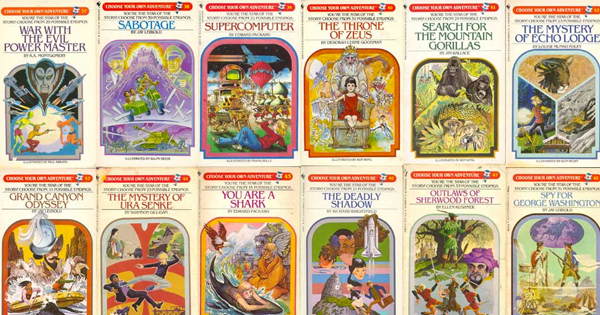R. A. Montgomery’s Choose Your Own Adventure series
The many possibilities of reading

I remember a time when the most thrilling words in the English language were:
If you pound on the door for help, turn to page 55.
If you find out who, or what, is in the coffin, turn to page 60.
I was intoxicated by the Choose Your Own Adventure series. I wasn’t drawn by the stories themselves. I can’t remember the plot, or rather plots, of a single one. But the gimmick was spellbinding enough. That a book would defer control over the story to me—eight-year-old me!—felt deliciously subversive.
The magus bestowing this power was the cryptic R. A. Montgomery, who appeared in his various author photos as a white-bearded man, posing, inveterately, in ski gear on a mountain slope. These grainy wintry portraits, combined with his curious name (echoes of The Princess Bride’s “S. Morgenstern”), suggested that he was himself a part of the fictional enterprise, no more substantial than the Yeti in the inaugural volume, The Abominable Snowman.
The source of the series’ appeal was its use of the second person. In each CYOA, the reader is the main character: “You are a deep sea explorer searching for the famed lost city of Atlantis …” “You are Chief of Operations for all spy activities outside the borders of Turtalia …” “Your uncle, Wei T’ai, is not a mean man, yet neither is he happy and easygoing …” But more exciting even than being a deep-sea explorer was being R. A. Montgomery. Every volume begins with a “Warning”: “You and YOU ALONE are in charge of what happens in this story.”
This led to a host of narrative perversities. You could, for instance, choose the least adventurous option at each turn (“If you give up the chase and escape, turn to page 17”), and end the story before it even began. More radically, the stories often ended in abrupt tragedy (“A blast of automatic fire ends your promising careers”) or without resolution (“The mystery of Uncle Morgan will never be solved”). There was also an illicit joy to be found in flipping through the various endings and trying to imagine how the same story could branch in so many surprising ways.
Before reading the CYOA books, I sometimes imagined that one day in the distant future I might become a writer. After reading them, I realized that I already was one.

